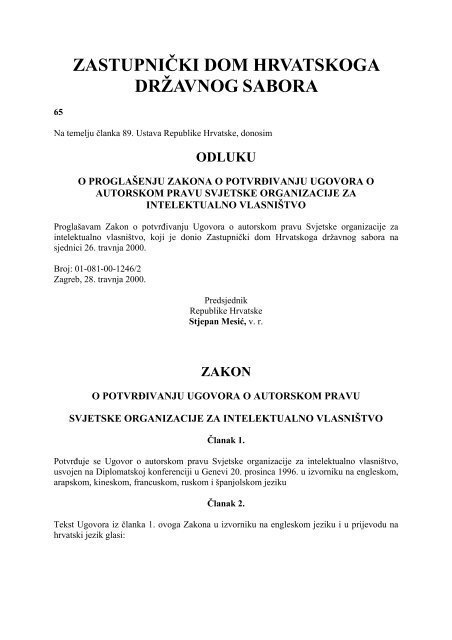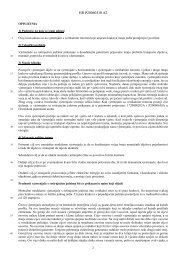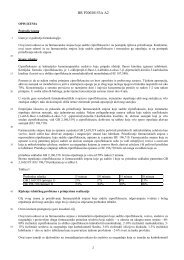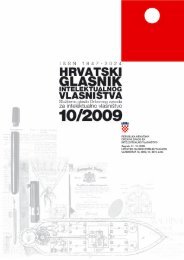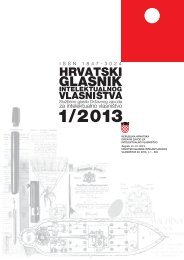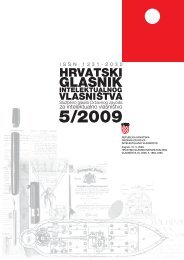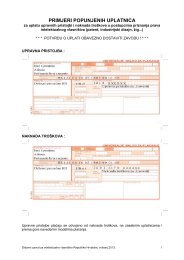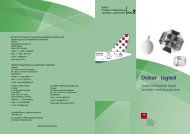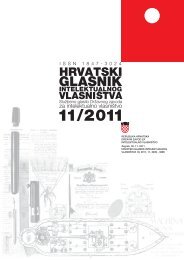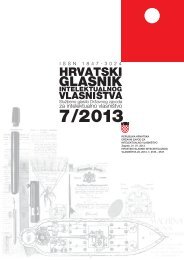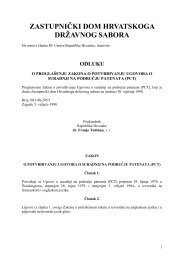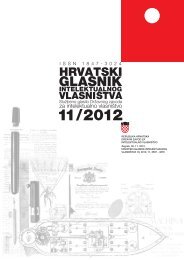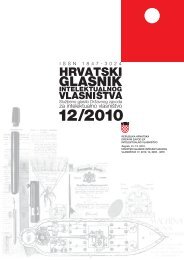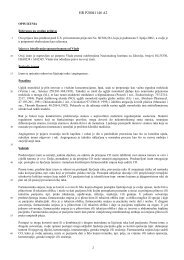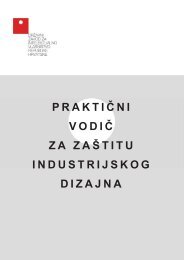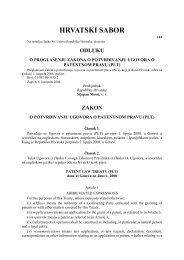Ugovor o autorskom pravu Svjetske organizacije za intelektualno ...
Ugovor o autorskom pravu Svjetske organizacije za intelektualno ...
Ugovor o autorskom pravu Svjetske organizacije za intelektualno ...
Create successful ePaper yourself
Turn your PDF publications into a flip-book with our unique Google optimized e-Paper software.
ZASTUPNIČKI DOM HRVATSKOGA<br />
DRŽAVNOG SABORA<br />
65<br />
Na temelju članka 89. Ustava Republike Hrvatske, donosim<br />
ODLUKU<br />
O PROGLAŠENJU ZAKONA O POTVRĐIVANJU UGOVORA O<br />
AUTORSKOM PRAVU SVJETSKE ORGANIZACIJE ZA<br />
INTELEKTUALNO VLASNIŠTVO<br />
Proglašavam Zakon o potvrđivanju <strong>Ugovor</strong>a o <strong>autorskom</strong> <strong>pravu</strong> <strong>Svjetske</strong> <strong>organi<strong>za</strong>cije</strong> <strong>za</strong><br />
<strong>intelektualno</strong> vlasništvo, koji je donio Zastupnički dom Hrvatskoga državnog sabora na<br />
sjednici 26. travnja 2000.<br />
Broj: 01-081-00-1246/2<br />
Zagreb, 28. travnja 2000.<br />
Predsjednik<br />
Republike Hrvatske<br />
Stjepan Mesić, v. r.<br />
ZAKON<br />
O POTVRĐIVANJU UGOVORA O AUTORSKOM PRAVU<br />
SVJETSKE ORGANIZACIJE ZA INTELEKTUALNO VLASNIŠTVO<br />
Članak 1.<br />
Potvrđuje se <strong>Ugovor</strong> o <strong>autorskom</strong> <strong>pravu</strong> <strong>Svjetske</strong> <strong>organi<strong>za</strong>cije</strong> <strong>za</strong> <strong>intelektualno</strong> vlasništvo,<br />
usvojen na Diplomatskoj konferenciji u Genevi 20. prosinca 1996. u izvorniku na engleskom,<br />
arapskom, kineskom, francuskom, ruskom i španjolskom jeziku<br />
Članak 2.<br />
Tekst <strong>Ugovor</strong>a iz članka 1. ovoga Zakona u izvorniku na engleskom jeziku i u prijevodu na<br />
hrvatski jezik glasi:
UGOVOR O AUTORSKOM PRAVU SVJETSKE ORGANIZACIJE ZA<br />
INTELEKTUALNO VLASNIŠTVO<br />
<strong>Ugovor</strong>ne stranke,<br />
PREAMBULA<br />
Želeći razviti i održati <strong>za</strong>štitu prava autora na njihova književna i umjetnička djela na što je<br />
moguće, djelotvorniji i ujednačeniji način,<br />
Priznavajući potrebu uvođenja novih međunarodnih pravila i pojašnjenja tumačenja određenih<br />
postojećih pravila kako bi se dala odgovarajuća rješenja na pitanja koja proizlaze iz novih<br />
gospodarskih, društvenih, kulturnih i tehnoloških razvitaka,<br />
Priznavajući velik utjecaj razvitka i međusobnog zbližavanja informacijskih i<br />
komunikacijskih tehnologija na stvaranje i uporabu književnih i umjetničkih djela,<br />
Naglašavajući izvanredan značaj <strong>za</strong>štite autorskog prava <strong>za</strong> poticanje književnog i<br />
umjetničkog stvaralaštva,<br />
Priznavajući potrebu održavanja ravnoteže između prava autora i širega javnog interesa,<br />
posebice obrazovanja, istraživanja i pristupa informacijama, kao što se to odražava u Bernskoj<br />
konvenciji,<br />
Sporazumjele su se kako slijedi:<br />
Članak 1.<br />
ODNOS PREMA BERNSKOJ KONVENCIJI<br />
1. Ovaj <strong>Ugovor</strong> je poseban sporazum u smislu članka 20. Bernske konvencije <strong>za</strong> <strong>za</strong>štitu<br />
književnih i umjetničkih djela, što se tiče ugovornih stranaka koje su članice Unije utemeljene<br />
tom Konvencijom. Ovaj ugovor nema nikakve veze s drugim ugovorima, osim s Bernskom<br />
konvencijom, niti šteti bilo kojim pravima ili obve<strong>za</strong>ma iz bilo kojega drugog ugovora.<br />
2. Ništa u ovom <strong>Ugovor</strong>u ne ukida postojeće obveze što ih ugovorne stranke imaju jedna<br />
prema drugoj prema Bernskoj konvenciji <strong>za</strong> <strong>za</strong>štitu književnih i umjetničkih djela.<br />
3. U daljnjem se tekstu »Bernska konvencija« odnosi na Pariški akt Bernske konvencije <strong>za</strong><br />
<strong>za</strong>štitu književnih i umjetničkih djela od 24. lipnja 1971.<br />
4. <strong>Ugovor</strong>ne će se stranke pridržavati članaka od 1. do 21. i Dodatka Bernskoj konvenciji.<br />
Članak 2.<br />
OPSEG ZAŠTITE AUTORSKOG PRAVA<br />
Zaštita autorskog prava proteže se na izražaje a ne na ideje, postupke, metode rada ili<br />
matematičke koncepte kao takve.
Članak 3.<br />
PPRIMJENA ČLANAKA OD 2. do 6. BERNSKE KONVENCIJE<br />
<strong>Ugovor</strong>ne će stranke primjenjivati mutatis mutandis odredbe članaka od 2. do 6. Bernske<br />
konvencije u pogledu <strong>za</strong>štite predviđene ovim <strong>Ugovor</strong>om.<br />
Članak 4.<br />
RAČUNALNI PROGRAMI<br />
Računalni programi <strong>za</strong>štićeni su kao književna djela u smislu članka 2. Bernske konvencije.<br />
Ta se <strong>za</strong>štita primjenjuje na računalne programe, bez obzira na način ili oblik njihova izražaja.<br />
Članak 5.<br />
KOMPILACIJE PODATAKA (BAZE PODATAKA)<br />
Kompilacije podataka ili druge građe, u bilo kojem obliku, koje prema izboru ili rasporedu<br />
svoga sadržaja čine intelektualne tvorevine, <strong>za</strong>štićene su kao takve. Ta se <strong>za</strong>štita ne proteže na<br />
same podatke ili građu i ne šteti bilo kojem <strong>autorskom</strong> <strong>pravu</strong> koje postoji na podacima ili<br />
građi sadržanoj u toj kompilaciji.<br />
Članak 6.<br />
PRAVO STAVLJANJA U PROMET<br />
1. Autori književnih i umjetničkih djela uživaju isključivo pravo davanja dopuštenja <strong>za</strong><br />
stavljanje na raspolaganje javnosti izvornika i primjeraka njihovih djela prodajom ili drugim<br />
prijenosom vlasništva.<br />
2. Ništa u ovom <strong>Ugovor</strong>u ne utječe na slobodu ugovornih stranaka da odrede uvjete, ako ih<br />
ima, pod kojim se iscrpljuje pravo iz stavka 1. nakon prve prodaje izvornika ili primjerka<br />
djela ili drugog prijenosa vlasništva uz dopuštenje autora.<br />
1. Autori:<br />
i) računalnih programa,<br />
ii) kinematografskih djela, i<br />
Članak 7.<br />
PRAVO IZNAJMLJIVANJA<br />
iii) djela ugrađenih u fonograme, kako je određeno u nacionalnom <strong>za</strong>konu ugovornih<br />
stranaka,<br />
uživaju isključivo pravo davanja dopuštenja <strong>za</strong> komercijalno iznajmljivanje javnosti izvornika<br />
ili primjeraka svojih djela.
2. Stavak 1. ne primjenjuje se:<br />
i) u slučaju računalnih programa, kada sam program nije bitan predmet iznajmljivanja, i<br />
ii) u slučaju kinematografskih djela, osim ako je takvo komercijalno iznajmljivanje dovelo do<br />
rasprostranjenog umnožavanja tih djela što osjetno šteti isključivom <strong>pravu</strong> na umnožavanje.<br />
3. Bez obzira na odredbe stavka 1., ugovorna stranka koja je na dan 15. travnja 1994. godine<br />
imala i još uvijek ima na snazi sustav pravične naknade autorima <strong>za</strong> iznajmljivanje primjeraka<br />
njihovih djela ugrađenih u fonograme može održati taj sustav pod pretpostavkom da<br />
komercijalno iznajmljivanje djela ugrađenih u fonograme osjetno ne šteti isključivom <strong>pravu</strong><br />
autora na umnožavanje.<br />
Članak 8.<br />
PRAVO PRIOPĆAVANJA JAVNOSTI<br />
Bez štete <strong>za</strong> odredbe iz članka 11., stavka 1., točke ii), iz članka 11bis., stavka 1., točke i) i<br />
točke ii), iz članka 11ter., stavka 1., točke ii), iz članka 14., stavka 1. točke ii) i iz članka<br />
14bis., stavka 1. Bernske konvencije, autori književnih i umjetničkih djela uživaju isključivo<br />
pravo davanja dopuštenja <strong>za</strong> priopćavanje javnosti njihovih djela, putem žica ili bez žica,<br />
uključujući stavljanje na raspolaganje javnosti njihovih djela na način da svatko može<br />
pristupiti tim djelima s mjesta i u vrijeme koje pojedinačno odabere.<br />
Članak 9.<br />
TRAJANJE ZAŠTITE FOTOGRAFSKIH DJELA<br />
U pogledu fotografskih djela, ugovorne stranke neće primjenjivati odredbe članka 7., stavka<br />
4. Bernske konvencije<br />
Članak 10.<br />
OGRANIČENJA I IZUZECI<br />
1. <strong>Ugovor</strong>ne stranke mogu, u svojem nacionalnom <strong>za</strong>konodavstvu predvidjeti ograničenja ili<br />
izuzetke od prava priznatih autorima književnih i umjetničkih djela ovim <strong>Ugovor</strong>om u<br />
određenim posebnim slučajevima koji nisu u suprotnosti s redovitim iskorištavanjem djela i<br />
neopravdano ne štete legitimnim interesima autora.<br />
2. <strong>Ugovor</strong>ne će stranke prilikom primjene Bernske konvencije, svesti bilo kakva ograničenja<br />
ili izuzetke od prava što ih ona predviđa, na određene posebne slučajeve koji nisu u<br />
suprotnosti s redovitim iskorištavanjem djela i neopravdano ne štete legitimnim interesima<br />
autora.
Članak 11.<br />
OBVEZE U POGLEDU TEHNIČKIH MJERA<br />
<strong>Ugovor</strong>ne će stranke predvidjeti odgovarajuću pravnu <strong>za</strong>štitu i djelotvorna pravna sredstva<br />
protiv osujećenja djelotvornih tehničkih mjera što ih autori rabe u svezi s izvršavanjem<br />
njihovih prava prema ovom <strong>Ugovor</strong>u ili Bernskoj konvenciji, a koje ograničavaju djelovanja u<br />
pogledu njihovih djela, koja nisu dopuštena od strane dotičnog autora ili nisu dopuštena<br />
<strong>za</strong>konom.<br />
Članak 12.<br />
OBVEZE U POGLEDU INFORMACIJA<br />
O UPRAVLJANJU PRAVIMA<br />
1. <strong>Ugovor</strong>ne će stranke predvidjeti odgovarajuća i djelotvorna pravna sredstva protiv svake<br />
osobe koja svjesno izvodi bilo koju od sljedećih radnji znajući, ili bi u smislu<br />
građanskopravnih pravila imala osnova znati da će to uzrokovati, omogućiti, olakšati ili<br />
sakriti povredu bilo kojeg od prava obuhvaćenih ovim <strong>Ugovor</strong>om ili Bernskom konvencijom:<br />
i) uklanjanje ili preinačavanje bez dopuštenja bilo koje elektroničke informacije o upravljanju<br />
pravima,<br />
ii) stavljanje u promet, uvoz radi stavljanja u promet, emitiranje ili priopćavanje javnosti bez<br />
dopuštenja, djela ili primjeraka djela znajući da su elektroničke informacije o upravljanju<br />
pravima uklonjene ili preinačene bez dopuštenja.<br />
2. U smislu ovoga članka, »informacije o upravljanju pravima« znače informaciju koja<br />
identificira djelo, autora djela, nositelja bilo kojeg prava na djelo, ili informacije o rokovima i<br />
uvjetima <strong>za</strong> uporabu djela te bilo koje brojeve ili kodove koji predstavljaju takve informacije,<br />
kada se bilo koja od tih informacija prilaže uz primjerak djela ili se pojavljuje u svezi s<br />
priopćavanjem djela javnosti.<br />
Članak 13.<br />
VREMENSKA PRIMJENA<br />
<strong>Ugovor</strong>ne stranke će primjenjivati odredbe članka 18. Bernske konvencije na sve <strong>za</strong>štite<br />
predviđene ovim <strong>Ugovor</strong>om.<br />
Članak 14.<br />
ODREDBE O OSTVARIVANJU PRAVA<br />
1. <strong>Ugovor</strong>ne stranke se obvezuju da će usvojiti, u skladu sa svojim pravnim sustavima, mjere<br />
potrebne <strong>za</strong> osiguranje primjene ovog <strong>Ugovor</strong>a.<br />
2. <strong>Ugovor</strong>ne stranke će osigurati da su postupci <strong>za</strong> prisilno ostvarivanje prava dostupni prema<br />
njihovu <strong>pravu</strong> takvi da omogućuju učinkovito djelovanje protiv bilo kojeg čina povrede prava
obuhvaćenih ovim <strong>Ugovor</strong>om, uključujući br<strong>za</strong> pravna sredstva <strong>za</strong> sprečavanje povrede prava<br />
i mjere <strong>za</strong> odvraćanje od daljnje povrede prava.<br />
1. a) <strong>Ugovor</strong>ne stranke imaju Skupštinu.<br />
Članak 15.<br />
SKUPŠTINA<br />
b) Svaku ugovornu stranku <strong>za</strong>stupa jedan i<strong>za</strong>slanik kojemu mogu pomagati <strong>za</strong>mjenici,<br />
savjetnici i stručnjaci.<br />
c) Troškove svakog i<strong>za</strong>slanstva snosi ugovorna stranka koja je imenovala i<strong>za</strong>slanstvo.<br />
Skupština može <strong>za</strong>tražiti od <strong>Svjetske</strong> <strong>organi<strong>za</strong>cije</strong> <strong>za</strong> <strong>intelektualno</strong> vlasništvo (u daljnjem<br />
tekstu »WIPO«) da odobri financijsku pomoć, radi olakšanja sudjelovanja, i<strong>za</strong>slanstvima<br />
ugovornih stranaka koje se smatraju zemljama u razvoju ili u skladu s utvrđenom praksom<br />
Opće skupštine Ujedinjenih naroda.<br />
2. a) Skupština se bavi održanjem i razvojem ovog <strong>Ugovor</strong>a te njegovom primjenom i<br />
provedbom.<br />
b) Skupština obavlja funkciju koja joj je namijenjena prema članku 17., stavku 2. u pogledu<br />
dopuštenja da određene međuvladine <strong>organi<strong>za</strong>cije</strong> postanu strankama ovog <strong>Ugovor</strong>a.<br />
c) Skupština odlučuje o sazivanju svake diplomatske konferencije o reviziji ovog <strong>Ugovor</strong>a i<br />
daje potrebne upute glavnom direktoru WIPO-a <strong>za</strong> pripremu takve diplomatske konferencije.<br />
3. a) Svaka ugovorna stranka koja je država ima jedan glas i glasuje samo u svoje ime.<br />
b) Svaka ugovorna stranka koja je međuvladina organi<strong>za</strong>cija može sudjelovati u glasovanju,<br />
umjesto svojih država članica, s brojem glasova koji je jednak broju njezinih država članica<br />
koje su stranke ovog <strong>Ugovor</strong>a. Nijedna takva međuvladina organi<strong>za</strong>cija neće sudjelovati u<br />
glasovanju ako bilo koja od njezinih država članica izvrši svoje pravo na glasovanje i obrnuto.<br />
4. Skupština se sastaje na redovnim sjednicama jednom u dvije godine na poziv glavnog<br />
direktora WIPO-a.<br />
5. Skupština donosi svoj poslovnik, koji uključuje sazivanje izvanrednih sjednica, pravila o<br />
kvorumu i, nije li drukčije određeno ovim <strong>Ugovor</strong>om, potrebnu većinu glasova <strong>za</strong> različite<br />
vrste odluka.<br />
Članak 16.<br />
MEĐUNARODNI URED<br />
Međunarodni ured WIPO-a obavlja administrativne poslove koji se odnose na <strong>Ugovor</strong>.
Članak 17.<br />
SPOSOBNOST POSTATI STRANKOM UGOVORA<br />
1. Svaka država članica WIPO-a može postati strankom ovog <strong>Ugovor</strong>a.<br />
2. Skupština može svojom odlukom dopustiti svakoj međuvladinoj organi<strong>za</strong>ciji da postane<br />
strankom <strong>Ugovor</strong>a koja izjavi da je nadležna, i koja ima svoje propise koji obvezuju sve<br />
njezine države članice, što se tiče ovog <strong>Ugovor</strong>a, te je propisno ovlaštena, prema svojim<br />
unutarnjim pravilima postati strankom ovog <strong>Ugovor</strong>a.<br />
3. Europska <strong>za</strong>jednica, davanjem izjave navedene u prethodnom stavku na Diplomatskoj<br />
konferenciji koja je usvojila ovaj <strong>Ugovor</strong>, može postati strankom ovog <strong>Ugovor</strong>a.<br />
Članak 18.<br />
PRAVA I OBVEZE IZ OVOG UGOVORA<br />
Ako se to ne protivi bilo kojoj posebnoj odredbi iz ovog <strong>Ugovor</strong>a, svaka ugovorna stranka<br />
uživa sva prava i preuzima sve obveze iz ovog <strong>Ugovor</strong>a.<br />
Članak 19.<br />
POTPISIVANJE UGOVORA<br />
Ovaj je <strong>Ugovor</strong> otvoren <strong>za</strong> potpisivanje do 31. prosinca 1997. godine svim državama<br />
članicama WIPO-a i Europskoj <strong>za</strong>jednici.<br />
Članak 20.<br />
STUPANJE NA SNAGU UGOVORA<br />
Ovaj će <strong>Ugovor</strong> stupiti na snagu istekom tri mjeseca nakon što 30 država položi isprave o<br />
ratifikaciji ili pristupu kod glavnog direktora WIPO-a.<br />
Ovaj <strong>Ugovor</strong> obvezuje<br />
Članak 21.<br />
DATUM POSTAJANJA STRANKOM UGOVORA<br />
i) 30 država navedenih u članku 20. od datuma stupanja na snagu ovog <strong>Ugovor</strong>a;<br />
ii) svaku drugu državu, nakon isteka tri mjeseca od datuma na koji je ta država položila svoju<br />
is<strong>pravu</strong> kod glavnog direktora WIPO-a,<br />
iii) Europsku <strong>za</strong>jednicu, nakon isteka tri mjeseca od polaganja njezine isprave o ratifikaciji ili<br />
pristupu, ako se takva isprava položi nakon stupanja na snagu ovog <strong>Ugovor</strong>a prema članku<br />
20., ili nakon isteka tri mjeseca od stupanja na snagu ovog <strong>Ugovor</strong>a, ako se takva isprava<br />
položi prije stupanja na snagu ovog <strong>Ugovor</strong>a;
iv) bilo koju drugu međuvladinu organi<strong>za</strong>ciju kojoj je dopušteno postati strankom ovog<br />
<strong>Ugovor</strong>a, nakon isteka tri mjeseca od polaganja njezine isprave o pristupu.<br />
Članak 22.<br />
ISKLJUČENJE REZERVI NA UGOVOR<br />
Nikakva rezerva na ovaj <strong>Ugovor</strong> nije dopuštena.<br />
Članak 23.<br />
OTKAZIVANJE UGOVORA<br />
Ovaj <strong>Ugovor</strong> može otka<strong>za</strong>ti svaka ugovorna stranka putem notifikacije upućene glavnom<br />
direktoru WIPO-a. Svaki će otkaz imati učinak nakon isteka godine dana od datuma na koji je<br />
glavni direktor WIPO-a primio tu notifikaciju.<br />
Članak 24.<br />
JEZICI UGOVORA<br />
1. Ovaj <strong>Ugovor</strong> je potpisan u jednom izvorniku na engleskom, arapskom, kineskom,<br />
francuskom, ruskom i španjolskom jeziku, s tim da su verzije na svim ovim jezicima jednako<br />
vjerodostojne.<br />
2. Službeni tekst na bilo kojem jeziku osim onih navedenih u stavku 1. utvrđuje glavni<br />
direktor WIPO-a na <strong>za</strong>htjev <strong>za</strong>interesirane stranke, nakon savjetovanja sa svim<br />
<strong>za</strong>interesiranim strankama. Za potrebe ovog stavka, »<strong>za</strong>interesirana stranka« znači svaku<br />
državu članicu WIPO-a čiji je službeni jezik, ili čiji je jedan od službenih jezika u pitanju, i<br />
Europsku <strong>za</strong>jednicu, te svaku drugu međuvladinu organi<strong>za</strong>ciju koja može postati strankom<br />
ovog <strong>Ugovor</strong>a, ako je jedan od njezinih službenih jezika u pitanju.<br />
Članak 25.<br />
DEPOZITAR<br />
Glavni direktor WIPO-a depozitar je ovog <strong>Ugovor</strong>a.
WIPO COPYRIGHT TREATY<br />
PREAMBLE<br />
The Contracting Parties,<br />
Desiring to develop and maintain the protection of the rights of authors in their literary and<br />
artistic works in a manner as effective and uniform as possible,<br />
Recognizing the need to introduce new international rules and clarify the interpretation of<br />
certain existing rules in order to provide adequate solutions to the questions raised by new<br />
economic, social, cultural and technological developments,<br />
Recognizing the profound impact of the development and convergence of information and<br />
communication technologies on the creation and use of literary and artistic works,<br />
Emphasizing the outstanding significance of copyright protection as an incentive for literary<br />
and artistic creation,<br />
Recognizing the need to maintain a balance between the rights of authors and the larger public<br />
interest, particularly education, research and access to information, as reflected in the Berne<br />
Convention,<br />
Have agreed as follows:<br />
Article 1<br />
RELATION TO THE BERNE CONVENTION<br />
(1) This Treaty is a sprecial agreement within the meaning of Article 20 of the Berne<br />
Convention for the Protection of Literary and Artistic Works, as regards Contracting Parties<br />
that are countries of the Union established by that Convention. This Treaty shall not have any<br />
connection with treaties other than the Berne Convention, nor shall it prejudice any rights and<br />
obligations under any other treaties.<br />
(2) Nothing in this Treaty shall derogate from existing obligations that Contracting Parties<br />
have to each other under the Berne Convention for the Protection of Literary and Artistic<br />
Works.<br />
(3) Hereinafter, »Berne Convention« shall refer to the Paris Act of July 24, 1971, of the Berne<br />
Convention for the Protection of Literary and Artistic Works.<br />
(4) Contracting Parties shall comply with Articles 1 do 21 and the Appendix of the Berne<br />
Convention.
Article 2<br />
SCOPE OF COPYRIGHT PROTECTION<br />
Copyright protection extends to expressions and not to ideas, procedures, methods of<br />
operation or mathematical concepts as such.<br />
Article 3<br />
APPLICATION OF ARTICLES 2 TO 6 OF THE BERNE CONVENTION<br />
Contracting Parties shall apply mutatis mutandis the provisions of Articles 2 to 6 of the Berne<br />
Convention in respect of the protection provided for in this Treaty.<br />
Article 4<br />
COMPUTER PROGRAMS<br />
Computer programs are protected as literary works within the meaning of Article 2 of the<br />
Berne Convention. Such protection applies to computer programs, whatever may be the mode<br />
or form their expression.<br />
Article 5<br />
COMPILATIONS OF DATA (DATABASES)<br />
Compilations of data or other material, in any form, which by reason of the selection or<br />
arrangement of their contents constitute intellectual creations, are protected as such. This<br />
protection does not extend to the data or the material itself and is without prejudice to any<br />
copyright subsisting in the data or material contained in the compilation.<br />
Article 6<br />
RIGHT OF DISTRIBUTION<br />
(1) Authors of literary and artistic works shall enjoy the exclusive right of authorizing the<br />
making available to the public of the original and copies of their works through sale or other<br />
transfer of ownership.<br />
(2) Nothing in this Treaty shall affect the freedom of Contracting Parties to determine the<br />
conditions, if any, under which the exhaustion of the right in paragraph (1) applies after the<br />
first sale or other transfer of ownership of the original or a copy of the work with the<br />
autohori<strong>za</strong>tion of the author.
Article 7<br />
RIGHT OF RENTAL<br />
(1) Authors of<br />
(i) computer programs;<br />
(ii) cinematographic works; and<br />
(iii) works embodied in phonograms, as determined in the national law of Contracting Parties,<br />
shall enjoy the exclusive right of authorizing commercial rental to the public of the originals<br />
or copies of their works.<br />
(2) Paragraph (1) shall not apply<br />
(i) in the case of computer programs, where the program itself is not the essential object of the<br />
rental; and<br />
(ii) in the case of cinematographic works, unless such commerical rental has led to<br />
widespread copying of such works materially impairing the exclusive right of reproduction.<br />
(3) Notwithstanding the provisions of paragraph (1), a Contracting Party that, on April 15,<br />
1994, had and continues to have in force a system of equitable remuneration of authors for the<br />
rental of copies of their works embodied in phonograms may maintain that system provided<br />
that the commercial rental of works embodied in phonograms is not giving rise to the material<br />
impairment of the exclusive right of reproduction of authors.<br />
Article 8<br />
RIGHT OF COMMUNICATION TO THE PUBLIC<br />
Without prejudice to the provisions of Articles 11(1)(ii), 11bis(1)(i) and (ii), 11ter(1)(ii),<br />
14(1)(ii) and 14bis(1) of the Berne Convention, authors of literary and artistic works shall<br />
enjoy the exclusive right of authorizing any communication to the public of their works, by<br />
wire or wireless means, including the making available to the public of their works in such a<br />
way that members of the public may access these works from a place and at a time<br />
individually chosen by them.<br />
Article 9<br />
DURATION OF THE PROTECTION OF<br />
PHOTOGRAPHIC WORKS<br />
In respect of photographic works, the Contracting Parties shall not apply the provisions of<br />
Article 7(4) of the Berne Convention.
Article 10<br />
LIMITATIONS AND EXCEPTION<br />
(1) Contracting Parties may, in their national legislation, provide for limitations of or<br />
exceptions to the rights granted to authors of literary and artistic works under this Treaty in<br />
certain special cases that do not conflict with a normal exploitation of the work and do not<br />
unreasonably prejudice the legitimate interests of the author.<br />
(2) Contracting Parties shall, when applying the Berne Convention, confine any limitations of<br />
or exceptions to rights provided for therein to certain special cases that do not conflict with a<br />
normal exploitation of the work and do not unreasonably prejudice the legitimate interests of<br />
the author.<br />
Article 11<br />
OBLIGATIONS CONCERNING TECHNOLOGICAL MEASURES<br />
Contracting Parties shall provide adequate legal protection and effective legal remedies<br />
against the circumvention of effective technological measures that are used by authors in<br />
connection with the exercise of their rights under this Treaty or the Berne Convention and that<br />
restrict acts, in respect of their works, which are not authorized by the authors concerned or<br />
permitted by law.<br />
Article 12<br />
OBLIGATIONS CONCERNING RIGHTS<br />
MANAGEMENT INFORMATION<br />
(1) Contracting Parties shall provide adequate and effective legal remedies against any person<br />
knowingly performing any of the following acts knowing, or with respect to civil remedies<br />
having reasonable grounds to know, that it will induce, enable, facilitate or conceal an<br />
infringement of any right covered by this Treaty or the Berne Convention:<br />
(i) to remove or alter any electronic rights management information without authority;<br />
(ii) to distribute, import for distribution, broadcast or communicate to the public, without<br />
authority, works or copies of works knowing that electronic rights management information<br />
has been removed or altered without authority.<br />
(2) As used in this Article, »rights management information« means information which<br />
identifies the work, the author of the work, the owner of any right in the work, or information<br />
about the terms and conditions of use of the work, and any numbers or codes that represent<br />
such information, when any of these items of information is attached to a copy of a work or<br />
appears in connection with the communication of a work to the public.
Article 13<br />
APPLICATION IN TIME<br />
Contracting Parties shall apply the provisions of Article 18 of the Berne Convention to all<br />
protection for in this Treaty.<br />
Article 14<br />
PROVISIONS ON ENFORCEMENT OF RIGHTS<br />
(1) Contracting Parties undertake to adopt, in accordance with their legal systems, the<br />
measures necessary to ensure the application of this Treaty.<br />
(2) Contracting Parties shall ensure that enforcement procedures are available under their law<br />
so as to permit effective action against any act of infringement of rights covered by this<br />
Treaty, including expeditious remedies to prevent infringements and remedies which<br />
constitute a deterrent to further infringements.<br />
Article 15<br />
ASSEMBLY<br />
(1)(a) The Contracting Parties shall have an Assembly.<br />
(b) Each Contracting Party shall be represented by one delegate who may be assisted by<br />
alternate delegates, advisors and experts.<br />
(c) The expenses of each delegation shall be borne by the Contracting Party that has appointed<br />
the delegation. The Assembly may ask the World Intellectual Property Organi<strong>za</strong>tion<br />
(hereinafter referred to as »WIPO«) to grant financial assistance to facilitate the participation<br />
of delegations Contracting Parties that are regarded as developing countries in conformity<br />
with the established practice of the General Assembly of the United Nations or that are<br />
countries in transition to a market economy.<br />
(2)(a) The Assembly shall deal with matters concerning the maintenance and development of<br />
this Treaty and the application and operation of this Treaty.<br />
(b) The Assembly shall perform the function allocated to it under Article 17(2) in respect of<br />
the admission of certain intergovernmental organi<strong>za</strong>tions to become party to this Treaty.<br />
(c) The Assembly shall decide the convocation of any diplomatic conference for the revision<br />
of this Treaty and give the necessary instructions to the Director General of WIPO for the<br />
preparation of such diplomatic conference.<br />
(3)(a) Each Contracting Party that is a State shall have one vote and shall vote only in its own<br />
name.<br />
(b) Any Contracting Party that is an intergovernmental organi<strong>za</strong>tion may participate in the<br />
vote, in place of its Member States, with a number of votes equal to the number of its Member
States which are party to this Treaty. No such intergovernmental organi<strong>za</strong>tion shall participate<br />
in the vote if any one of its Member States exercises its right to vote and vice versa.<br />
(4) The Assembly shall meet in ordinary session once every two years upon convocation by<br />
the Director General of WIPO.<br />
(5) The Assembly shall establish its own rules of procedure, including the convocation of<br />
extraordinary sessions, the requirements of a quorum and, subject to the provisions of this<br />
Treaty, the required majority for various kinds of decisions.<br />
Article 16<br />
INTERNATIONAL BUREAU<br />
The International Bureau of WIPO shall perform the administrative tasks concerning the<br />
Treaty.<br />
Article 17<br />
ELIGIBILITY FOR BECOMING PARTY TO THE TREATY<br />
(1) Any Member State of WIPO may become party to this Treaty.<br />
(2) The Assembly may decide to admit any intergovernmental organi<strong>za</strong>tion to become party<br />
to this Treaty which declares that it is competent in respect of, and has its own legislation<br />
binding on all its Member States on, matters covered by this Treaty and that it has been duly<br />
authorized, in accordance with its internal procedures, to become party to this Treaty.<br />
(3) The European Community, having made the declaration referred to in the preceding<br />
paragraph in the Diplomatic Conference that has adopted this Treaty, may become party to<br />
this Treaty.<br />
Article 18<br />
RIGHTS AND OBLIGATIONS UNDER THE TREATY<br />
Subject to any specific provisions to the contrary in this Treaty, each Contracting Party shall<br />
enjoy all of the rights and assume all of the obligations under this Treaty.<br />
Article 19<br />
SIGNATURE OF THE TREATY<br />
This Treaty shall be open for signature until December 31, 1997, by any Member State of<br />
WIPO and by the European Community.
Article 20<br />
ENTRY INTO FORCE OF THE TREATY<br />
This Treaty shall enter into force tree months after 30 instruments of ratification or accession<br />
by States have been deposited with the Director General of WIPO.<br />
This Treaty shall bind:<br />
Article 21<br />
EFFECTIVE DATE OF BECOMING PARTY TO THE TREATY<br />
(i) the 30 States referred to in Article 20, from the date on which this Treaty has entered into<br />
force;<br />
(ii) each other State from the expiration of three months from the date on which the State has<br />
deposited its instrument with the Director General of WIPO;<br />
(iii) the European Community, from the expiration of three months after the deposit of its<br />
instrument of ratification or accession if such instrument has been deposited after the entry<br />
into force of this Treaty according to Article 20, or, three months after the entry into force of<br />
this Treaty if such instruments has been deposited before the entry into force of this Treaty;<br />
(iv) any other intergovernmental organi<strong>za</strong>tion that is admitted to become party to this Treaty,<br />
from the expiration of three months after the deposit of its instrument of accession.<br />
No reservation to this Treaty shall be admitted.<br />
Article 22<br />
NO RESERVATIONS TO THE TREATY<br />
Article 23<br />
DENUNCIATION OF THE TREATY<br />
This Treaty may be denounced by any Contracting Party by notification addressed to the<br />
Director General of WIPO. Any denunciation shall take effect one year from the date on<br />
which the Director General of WIPO received the notification.<br />
Article 24<br />
LANGUAGES OF THE TREATY<br />
(1) This Treaty is signed in a single original in English, Arabic, Chinese, French, Russian and<br />
Spanish languages, the versions in all these languages being equally authentic.<br />
(2) An official text in any language other than those referred to in paragraph (1) shall be<br />
established by the Director General of WIPO on the request of an interested party, after
consultation with all the interested parties. For the purposes of this paragraph, »interested<br />
party« means any Member State of WIPO whose official language, or one of whose official<br />
languages, is involved and the European Community, and any other intergovernmental<br />
organi<strong>za</strong>tion that may become party to this Treaty, if one of its official languages is involved.<br />
Article 25<br />
DEPOSITARY<br />
The Director General of WIPO is the depositary of this Treaty.<br />
Članak 3.<br />
Za provedbu ovoga Zakona nadležan je Državni <strong>za</strong>vod <strong>za</strong> <strong>intelektualno</strong> vlasništvo.<br />
Članak 4.<br />
Na dan stupanja na snagu ovoga Zakona <strong>Ugovor</strong> iz članka 1. ovoga Zakona <strong>za</strong> Republiku<br />
Hrvatsku nije na snazi, te će se podaci o njegovu stupanju na snagu objaviti sukladno odredbi<br />
članka 30. stavka 3. Zakona o sklapanju i izvršavanju međunarodnih ugovora.<br />
Članak 5.<br />
Ovaj Zakon stupa na snagu danom objave u »Narodnim novinama«.<br />
Klasa: 910-04/00-01/02<br />
Zagreb, 26. travnja 2000.<br />
ZASTUPNIČKI DOM HRVATSKOGA DRŽAVNOG SABORA<br />
Predsjednik<br />
Zastupničkog doma<br />
Hrvatskoga državnog sabora<br />
Zlatko Tomčić, dipl. ing., v. r.


